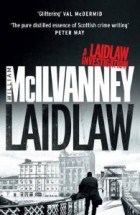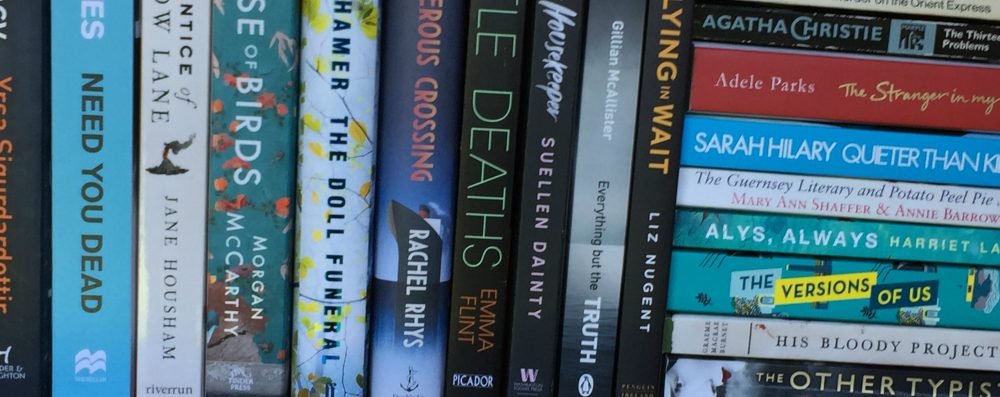
4*s
I read this book on Fiction Fan’s recommendation since this book was gave this her FictionFan Crime Thriller Award Winner back in 2013, yes I know, I don’t like to rush to read promising books!!
Detective Inspector Jack Laidlaw is investigating the rape and murder of pretty young Jennifer Lawson who was recently reported missing by her father. Detective Constable Harkness is there to assist him, newly transferred he has been warned about Laidlaw’s unorthodox methods. But the police aren’t the only ones investigating this crime – Jennifer’s father is determined to find the killer first.
Set in 1970s Glasgow hardly a page is turned that doesn’t have a snarl or a raised fists which alongside the nervousness of the women all reinforce the menace that stalks through this book. Times are hard in Glasgow with the national industries closing down and so these hard men need to make their mark on the world in the way they know best, through violence.
Unsurprisingly since this book was originally published in the 1977 the sense of time is shockingly well done including the bigotry that ran rife in Glasgow at that time. I’m not sure that poor Jennifer would have put up with the way her father ruled her and her mother quite as meekly in this day and age. His uncompromising manner had meant that there were hints of a secret boyfriend after she chose someone unsuitable in his eyes a while earlier, but was her murder committed by someone she knew, or was it perhaps a chance killing. That’s what the maverick that is Laidlaw intends to find out. But, he is considered unusual for a policeman in those macho times, because he cared about the causes of crime as a fellow officer commented:
“You’ll have to wear wellies when you work with him. To wade through the tears. He thinks criminals are underprivileged.”
Whilst the mystery itself is fairly run of the mill when you discount that this is the first of the genre now known as ‘Tartan Noir’ the beauty of this book is in its language. It is a joy to turn the page and find something pretty much quotable on practicably every page.
Sunday in the park – it was a nice day. A Glasgow sun was out, dully luminous, an eye with cataract. Some people were in the park pretending it was warm, exercising that necessary Scottish thrift with weather which hoards every good day in the hope of some year amassing a summer.
Partly because of the lyrical language this reads quite unlike most crime fiction; it isn’t a book to be devoured to find out whodunit because we know who the perpetrator is fairly on, the question is who will get to them first, the police or local justice? This is book to savour to think about the views of all involved even those who are apparently viciously elbowed out like Jennifer’s mother by the men determined to find their man and make him pay.
The one element which worried me ahead of reading this novel was the inclusion of the dialect; I’m not a big fan of dialect in a book but I honestly didn’t struggle with the inclusion in this one either in terms of meaning or with the inevitable slow-down it usually causes adapting to unfamiliar letter patterns which tend to pull me outside of the story. This was one book where those short and infrequent bursts of dialect did add rather than detract from the story particularly when I worked out Laidlaw’s use of it himself gave a pointer to the type of person he was conversing with!
An all-round enjoyable read which I’m delighted to have finally read – the next two in this trilogy are now on the wishlist and I don’t intend leaving it quite so long to get around to reading them.
First Published UK: 1977
Publisher: Cannongate Books
No of Pages 304
Genre: Crime Fiction
Amazon UK
Amazon US

Brilliant author, isn’t he? I really enjoyed the first one and have been saving the next two… isn’t that awful? I always end up reading the ones I like far less, because I keep saving them up – for what exactly? A rainy day? Well, there should be plenty of those in England, right?
LikeLiked by 1 person
Haha you can depend on plenty of rainy days in the UK
LikeLike
Long time since I read this book. Great review!
LikeLike
It’s great to see another perspective on this book, Cleo. On a personal level, I suspect I’m a bit sensitive when it comes to crime novels set in the era of my childhood as I found the story a little too unsettling for my own comfort levels. (I’m in a similar place with David Peace’s Red Riding series – great books, but the unremitting bleakness can be hard to take after a while.) McIlvaney’s prose is excellent though – as you say, there is a lyrical quality to the writing which is rare in this genre of fiction.
LikeLike
So glad you enjoyed this as well as you did, Cleo! I think it’s an excellent crime novel with some fine character development. And I do like the authentic sense of place and time. The rest of the trilogy is great, too.
LikeLike
Reblogged this on Don Massenzio's Blog.
LikeLike
I re-read this last year as I was meant to be interviewing him prior to Bloody Scotland; unfortunately he was ill so I didn’t get a proper interview, although we did have a couple of lovely chats on the phone. Sadly a couple of months later he passed away. Like Marina, I’ve saved the third one. I’d agree his dialect is much more comprehensible than, say, Irvine Welsh’s – although perhaps it’s because that’s the way we talk! Agree with Jacqui that David Peace’s Red Riding books are wonderful – but yes, very depressing, especially if you binge on them like I did! I think I had to give up in the middle of 1983, but I still have it. So glad you enjoyed this – one of my favourite books. His website is worth a look; it contains all his journalism and some of his poetry – and it’s all as finely written as Laidlaw.
LikeLike
I read this and liked it too. I’ve still to get to the other two in the series. That’s the problem when you jump on board a series.
LikeLike
I do love books with lyrical language, so I’m very interested in this one. Thanks for sharing.
LikeLike
Hi Cleo,
I must admit to preferring stand alone stories, over series books. I always tend to pick a book mid-way through a series and end up playing catch-up in getting to know the characters and how and why they are where they are today!
Your review really brought the character and a sense of place, to life. Although I am not usually a big fan of dialect, which whilst adding authenticity to the story, can also take me out of the plot, as I struggle to concentrate on the character interaction.
It sounds as though William has got the balance just about right for you and brings to mind another Scots author I am very fond of, Alan Jones. I have the third and most recent of Alan’s books in my TBR pile and although all are stand alone stories, each new addition illustrates more clearly, the pride in his homeland and its people.
Thanks for sharing 🙂
Yvonne
LikeLike